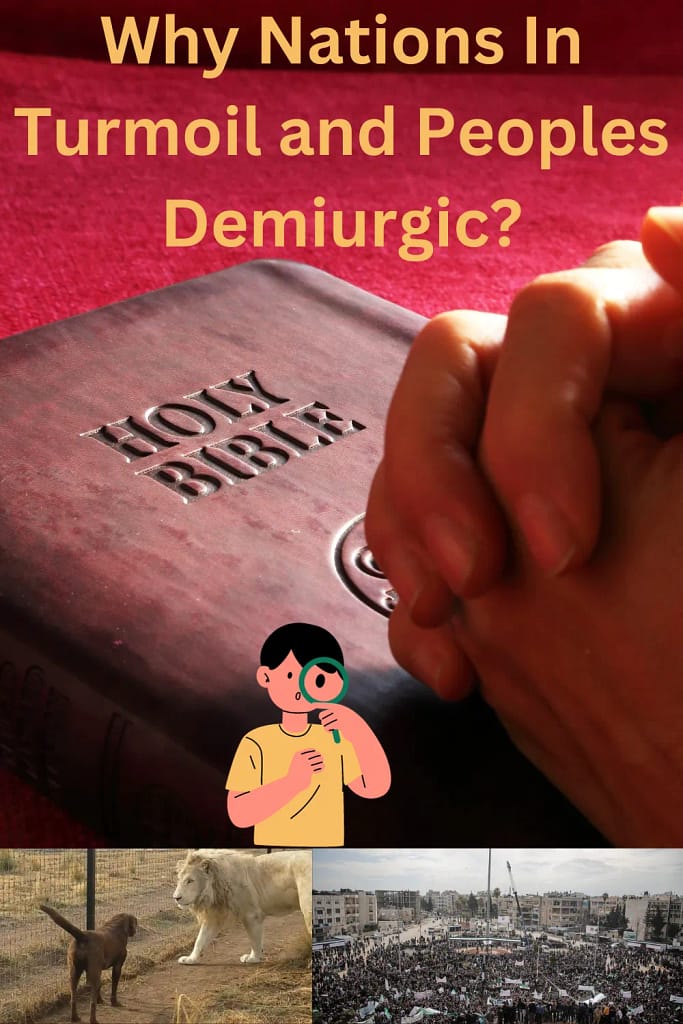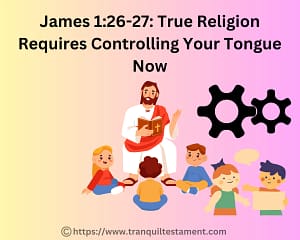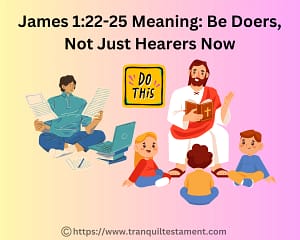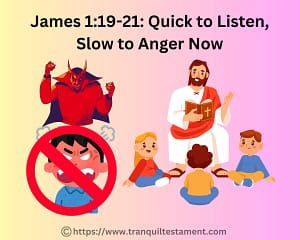Proverbs 15: A Gentle Answer Turns Away Wrath Now. Unfortunately, confrontation is part of life. Anger is not automatically sinful. Paul wrote in Ephesians 4:26, “Be angry, and yet do not sin; do not let the sun go down on your anger…” So there is a place for anger, but it must be controlled and disciplined so that the response will not lead to further, sinful, anger.
What is the meaning of Proverbs 15 verse 1?
This is the intent of Verse 1 ,
“A gentle answer turns away wrath, but a harsh word stirs up anger.”
If one person makes a statement that is antagonistic, rude, or mean; the subject of that statement has a choice to make. In too many cases, the automatic response is to strike out in kind; but that simply intensify the conflict. How many times has an argument led to a fight and even a death because of harsh words?
It is hard not to do that if a person believes the accusations are wrong or unfair. But the response of a righteous person, a God-directed person, a Christian should be the very opposite. A gentle answer can defuse a situation.
Even if the other person persists, the best choice is to stay calm and, if necessary, to walk away. The teaching in both the Old and New Testament emphasize this principle. In fact Peter warns that Christians should expect such incidents to occur.
What does Proverbs 15:3 mean?
Verse 3, emphasizes why this should be the standard for Christian conduct,
“The eyes of the Lord are in every place, watching the evil and the good.”
It is so easy to get angry when vindictive attacks are leveled against a person or his/her loved ones. It would so easy to try to justify a harsh. “I know what I’m supposed to do, but…” Then the rationalization comes.
However, there is no “but”, because the Lord knows what each person is doing. There is no place where a person can hide, and when a Christian responds appropriately in such situations, God is glorified.
What does verse 4 mean?
Verse 4 carries a warning,
“A soothing tongue is a tree of life, but perversion in it crushes the spirit.”
How many times has a kind word helped in times of distress? It can be a simple, “I love you” or “I am here” that can make all the difference in the world. A soothing word is a characteristic of a Christ-directed life.
Differences will occur between Christians, but the foundation of all Christian relationships must be love and respect. A few soothing words may be remembered for the rest of that person’s life.
But that same tongue also has the potential to do great damage. In James 3, James warned that the tongue can set a forest on fire. Words that are hurtful, mean, spiteful, untrue can do great damage to a person.
The spiritual and emotional damage can last for years. And James makes very clear where such words come from,
“And the tongue is a fire, the very world of iniquity; the tongue is set among our members as that which defiles the entire body, and sets on fire the course of our life, and is set on fire by hell.”
What is Proverbs 15:8?
Verse 8 states,
“The sacrifice of the wicked is an abomination to the Lord, but the prayer of the upright is His delight.”
Under the Law of Moses, the sacrifice could refer to several sacrifices. It may have been for specific animal sacrifices required under the Law. It may have been the required tithing of a person’s goods or money. But the important point in verse 8 is not WHAT was given, but the righteousness of the person.
Israel and Judah were continually condemned in the writings of the Old Testament because they truly did not submit to God’s Will. If any sacrifice was offered, it was more of show than commitment. The entire book of Malachi addresses this very issue.
Then, in the New Testament, Jesus pointed out the true sacrifice of the widow who gave all she had as opposed to the wealthy who gave out of their wealth. Jesus condemned the Jewish leadership for being seen in public as they prayed, and He condemned the prayer of the Pharisee as compared to the Publican. The casual offering of the wicked is clearly rejected by God.
Sacrifice is to be a loving and grateful offering to God because He IS the Living God. For Christians especially, there must be a willingness to give gladly. The Great Commandment is to Love the Lord Your God with all your heart, soul and mind.
This means a changed life and a changed focus in life. The last half of verse 8 states that the prayer of the righteous is His delight. When a person truly loves God, service, prayer, and sacrifice are not really sacrifices. Such actions are joyful reflections of a person’s love for his/her Father in Heaven.
What does Proverbs 15-10 mean?
Verse 10 warns,
“Grievous punishment is for him who forsakes the way; he who hates reproof will die.”
What happens when a person knows what to do, and maybe even followed that way, and then begins to drift? To make matters worse, as others try to bring him/her back, that person rejects their efforts and falls completely away. In both the Old and New Testament teaching, the result is punishment and death.
Obeying the Gospel and being baptized in Jesus Christ for the remission of sins leads to the most wonderful blessings that are truly eternal in nature. But becoming a Christian also involves a serious commitment and responsibility. There is no “Changing my mind” later.
Some of the strongest warnings in the New Testament are found in the Book of Hebrews.
“For if we go on sinning willfully after receiving the knowledge of the truth, there no longer remains a sacrifice for sins, but a terrifying expectation of judgment and the fury of a fire which will consume the adversaries.”
and Hebrews 10:30-31,
“For we know Him who said, ‘Vengeance is Mine, I will repay.’ And again, ‘The Lord will judge His people.’ It is a terrifying thing to fall into the hands of the living God.”
What is Proverbs 15-13-?
Verse 13 states,
“A joyful heart makes a cheerful face, but when the heart is sad, the spirit is broken.”
Most people have experienced moments of pure joy. A wedding, the birth of a child, the return of a loved one that was lost are all examples of times of joy. These moments are special and are remembered with affection.
A joyful heart is much more in that it is sustained by a sense of goodness. Other people can easily see that joy, because it is reflected in the person’s face and attitude.
Death, tragedy, illness, or unexpected suffering can make a person’s heart sad. Events can crush down on a person’s spirit. When that happens, joy seems far away. Oh, a person may put on a “brave face” before others, but inside is darkness and despair.
One many wrote that “most people live lives of quiet desperation”. Without God and without the promise that comes through Jesus Christ, how can a person withstand tragic times that will happen in life?
Without the Gospel hope, that crushing weight of despair will often break a person’s spirit. But the message is a message of hope! Like anyone else, a Christian will face illness, death, tragedy, and unexpected suffering.
In Romans 7:37-39 Paul proclaimed,
“But in all these things we overwhelmingly conquer through Him who loved us. For I am convinced that neither death, nor life, nor angels, nor principalities, nor things present, nor things to come, nor powers, nor height, nor depth, nor any other created thing, will be able to separate us from the love of God, which is in Christ Jesus our Lord.”
There is hope in Jesus Christ that will strengthen the spirit so that it will never be broken.

Verses 16 and 17 carry the same thought,
“Better is a little with the fear of the Lord than great treasure and turmoil with it. Better is a dish of vegetables where love is than a fattened ox served with hatred.”
Wealthy people, powerful people are often envied and admired because of their wealth and power. “He is rich; therefore, he can help me.” “He is powerful; therefore, he should give me what I ask.” All people see is the outer trappings, the worldly indications of their positions. That is coveting what another has and that is sin!
Having wealth or having power is not automatically wrong or sinful. But the pull of the world can be very strong, and the more a person has in the world, the stronger will be that attraction to keep what he, or she, has. Satan tried to tempt Jesus by showing Him all the wealth and power in the world.
The Jewish leadership acknowledged that Jesus performed miracles of healing, but all they could see was a threat to their power. The young rich ruler turned away from Jesus with sorrow, because he could not let go of his wealth and lands.
When wealth and power become the central part of a person’s life, then that person will reap the curses of a godless life. True love will be elusive. “Does he/she love me or my money?” Envy can become hatred. Wanting can become greed. The death of an older family member leads to lawsuits and fighting over the remains. And the end result is a life filled with bitterness and turmoil.
Finally, it does not matter how much a person has in this life. When that person physically dies, he/she will be no different whether rich or poor, powerful or helpless. When this life ends, the righteous person will joyfully look on the Eternal Face of Love. But for the one who looked to the pleasures of this life, the end will be a horrifying realization that the opportunity of life was gone.








[…] plans of the heart belong to man, But the answer of the tongue is from the […]